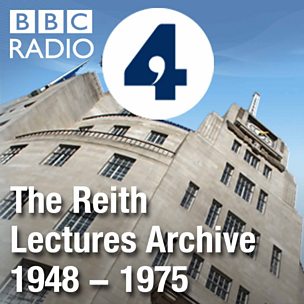BBC Radio Podcasts from The Reith Lectures: Archive 1948-1975
The Birth of Exploration
Dr Daniel J Boorstin considers the importance of an adventurous spirit for exploration.
On Difference
Professor Ralf Dahrendorf discusses the concept of difference and averages.
Justice Without Bondage
Professor Ralf Dahrendorf evaluates how equality has affected liberal justice.
The Liberal Option
Professor Ralf Dahrendorf explores the liberal options available to society.
From Expansion to Improvement
Professor Ralf Dahrendorf defines liberty and evaluates its evolution in society.
The Search For A New Order
Professor Alastair Buchan explores how transnational co-operation links to global change.
The Troubled Giant
Professor Alastair Buchan analyses America's multilateral power structures.
Wanted: An Instrument For Crisis Management
Sir Andrew Shonfield considers the long-term future of the European Community.
From Technocracy to Democracy
Sir Andrew Shonfield asks how Britain's inclusion will affect the European Community.
European Foreign Policy Towards Asia & the Soviet Bloc
Sir Andrew Shonfield explores the effects of the European Community's foreign policy.
The American Connection
Sir Andrew Shonfield explores Europe's political relationship with America.
The French Spirit and the British Intruder
Sir Andrew Shonfield identifies the problems in creating a European Federation.
Melting Pot or Bag of Marbles?
Sir Andrew Shonfield debates the prospects of the European Community.
A Common Ground
Richard Hoggart analyses how humans fundamentally understand each other via communication.
The Loss of the Stable State
Donald Schon analyses society's need for a stable position of balance.
Where Does Responsibility Lie?
Sir Fraser Darling asks who is responsible for the protection of the natural world.
The Forward Look in Conservation
Sir Frank Fraser Darling considers the art of conservation.
Global Changes - Actual and Possible
Sir Frank Fraser Darling reflects on the problem of overpopulation.
The Technological Exponential
Sir Fraser Darling explores the ecological consequences of the industrial revolution.
Impact of Man on His Environment
Sir Frank Fraser Darling explores the impact of Man on his environment.
Man and Nature
Sir Frank Fraser Darling argues for the conservation of humans.
The United States of the World
Lester Pearson contemplates the concept of nationalism in an international world.
'Only Connect...'
Professor Edmund Leach explores the importance of the interconnectedness of the universe.
Ourselves and Others
Professor Edmund Leach analyses the human fear of 'the other'.
The Role of the State
Professor J K Galbraith explores the power large corporations could have over the state.
Economic Meetings
Robert Gardiner considers the problems of economic inequality and race relations.
Contemporary Racial Moods
Robert Gardiner explores the myths of race; from past history to current frustrations.
Industrial And Economic Consequences
Leon Bagrit considers the problems and advantages of widespread automation in Britain.
The Fulfilment of Lives
Dr Albert E Sloman considers how to build a social environment within the university.
Vicissitudes of Adolescence
Professor George Carstairs considers why teenagers are drawn to violence and sex.
The Problem of White Settlement
Margery Perham considers the problem of the European colonists.
African Nationalism
Margery Perham explores how anti-colonialism led to emancipation in Africa.
The Mechanization of Art
Edgar Wind considers how machines have influenced the production and evaluation of art.
The Fear of Knowledge
Edgar Wind explores how knowledge allows our aesthetic perception of art to be heightened.
Future of Man
Professor PM Medawar considers the future of human evolution.
The Origin of the Universe 2
Professor Bernard Lovell explores the continuous creation theory of the universe.
The Origin of the Universe 1
Professor Bernard Lovell contemplates the implications of evolutionary theory.
The Military Problem
Professor George Kennan discusses the military tensions between the Russia and the West.
The Problem of Eastern and Central Europe
Professor George F Kennan considers the effect of Soviet Satellite States in Europe.
Science and Education
Professor Edward Appleton considers how to teach science in order to inspire new talent.
Industrial Science
Professor Edward Appleton analyses the functional sciences created for industry.
Architecture and Planning: The Functional Approach
Nikolaus Pevsner explores how England's town centres have traditionally been planned.
Constable and the Pursuit of Nature
Nikolaus Pevsner examines the flowering of English landscape painting in the 18th century.
Blake and the Planing Line
Nikolaus Pevsner places the artist William Blake in the context of an English tradition.
Perpendicular England
Nikolaus Pevsner examines 'the most English creation in architecture'.
Reynolds and Detachment
Nikolaus Pevsner examines the contradiction at the heart of Sir Joshua Reynolds' work.
Hogarth and Observed Life
Nikolaus Pevsner considers the 'Englishness' of the artist William Hogarth.
The Geography of Art
Nikolaus Pevsner explores the English national character as expressed in terms of art.
The Atlantic Bridge
Sir Oliver Franks analyses the political relationship between Britain and the USA.
The Sciences and Man's Community
Professor Robert Oppenheimer explains how human communities resemble atoms.
The Psychology of Encounters
Professor Arnold Toynbee considers the psychological effects of culture.
British Rule In India
Lord Radcliffe examines the early period of British administration in India.
Individual and Social Ethics
Bertrand Russell argues for personal morality over tribal customs to guide conduct.
Control and Initiative: Their Respective Spheres
Bertrand Russell considers the roles of state control in a progressive society.
The Conflict of Technique and Human Nature
Bertrand Russell considers the role of human nature in the development of society.
The Role of Individuality
Bertrand Russell argues for the importance of individual initiative in a community.
Social Cohesion and Government
Bertrand Russell examines the effects of increasing state control.
Social Cohesion and Human Nature
In the inaugural Reith lecture, Bertrand Russell examines the impulses in human nature.
